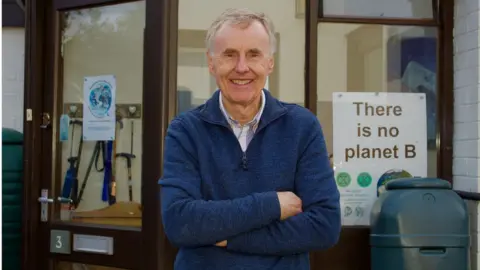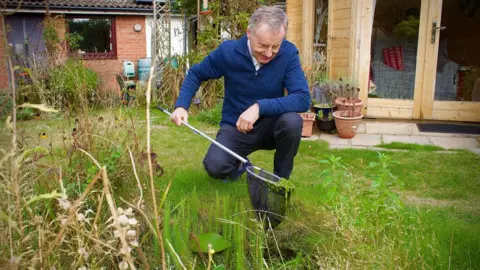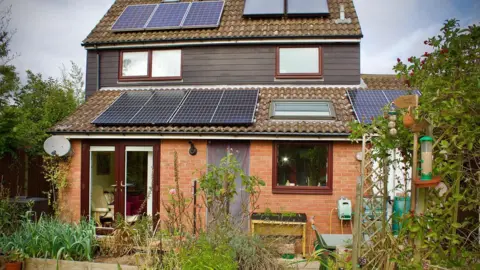COP26: 'I've gone green for the sake of my grandchildren'
 Martin Giles/BBC
Martin Giles/BBCWhile world leaders try to agree on new actions on climate change, the scale of the issue can feel overwhelming. The BBC spoke to Dave Green, whose Suffolk village held its own climate summit, on how we can all make a difference in our day-to-day lives.
Martlesham, near Ipswich, wants to be green. Like many other local authorities, its parish council declared a climate emergency last year and set up its own Climate Action Group.
Its aim is to improve the natural environment with wilding and to encourage residents, with a weekly advice hub, to reduce their carbon footprint.
A month before COP26, experts and villagers gathered at the church to hear about, among other topics, the science of climate change, vegan food, solar panels, biodiversity and heat pumps.
Retired science teacher and grandfather Dave Green chairs the group and helped organise its first climate summit.
 Martin Giles/BBC
Martin Giles/BBC"The more you look into climate science and look at the evidence about what's going on the more worried you become, and the more depressed, if you're not careful," he said.
"What I've decided to do, for the sake of my children and my grandchildren, is to start doing something.
"The world they will grow up in, unless we do something, it's too awful to contemplate, really.
"Initially you think 'It's decades away, the government will sort it, it's not a problem.'
"Then you realise it's not decades away, we are seeing the effects already, and in order to do something I decided to do something about my own carbon footprint."
 Martin Giles/BBC
Martin Giles/BBCHe started making small changes, from buying hot and cold composters and water butts and getting better at reusing and recycling.
He bought a £30 induction hob which, along with an outdoor heat pump, means he no longer uses gas for heating or cooking.
His home in now off-grid. Solar panels and solar water panels have saved him roughly 2,000kg (4,409lb) of carbon per year, the equivalent of driving 10,000 miles (16,093km) in a car, he said.
Buying food locally
"There are a lot of low-cost things we can do," he said.
"With diet, certain foods have a higher carbon footprint than others.
"Buying food locally can make a important difference, and you can try to make changes to how you move around, cycle more, and use less transport."
Those of us with gardens, like Mr Green, can stimulate biodiversity by creating natural ponds, planting wildflower beds and making habitats for bees and hedgehogs.
"There is an analogy with the Covid vaccination programme," he said.
"If one person has the vaccine it won't make much difference to the virus circulating, but if most of us do, it makes a huge difference.
"If we all start to do something - if you start making small steps and find out a little bit more about how you can reduce your carbon footprint - the more people that do that, the bigger the impact will be.
"And we do need to do that, because it really is an emergency."

Find BBC News: East of England on Facebook, Instagram and Twitter. If you have a story suggestion email [email protected]
